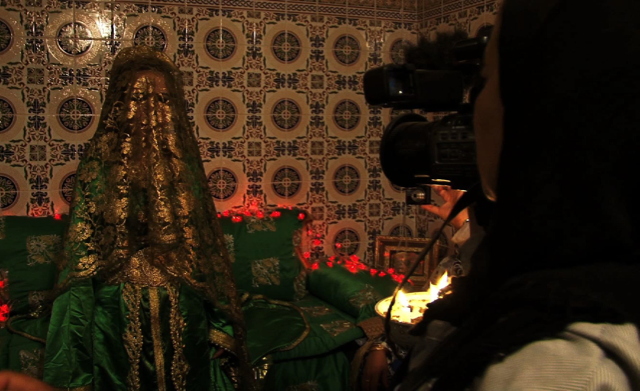 The Human Rights Watch Film Festival just ended, exhibiting some beautiful and undeniably poignant tales that are not always told, nor heard.
The Human Rights Watch Film Festival just ended, exhibiting some beautiful and undeniably poignant tales that are not always told, nor heard.
Bringing together stories from across the globe, I’ve chosen four films that I believe echo and reverberate optimism in the face of fear and oppression,
thereby ultimately triggering an excitement of a better future for women, everywhere.
All four films come from different pockets of the world (Iran, Jordan, Senegal and Morocco, respectively) and detail unique and yet harrowingly similar
stories of hardship. My experience of this festival was the compelling nature of the women in all four stories. Their belief in their own ability, despite
being systematically told otherwise, is a resonating and enduring legacy that I’m fortunate to have experienced.
Going Up the Stairs: Portrait of an Unlikely Iranian Artist
Going Up the Stairs: Portrait of an Unlikely Iranian Artist
by director Rohksareh Ghaem Maghami focuses on the artist, Akram. Both Maghami and Akram were married off before the ages of ten, struggling to
find a place in a structure where their voices had little effect and importance. For years Akram complied to the wishes of her husband,
Heidap. He made her drop out of school and threatened her with physical deformations if she disobeyed. After her
grandson asked her to work on a drawing, Akram began to paint as if governed by some primal instinct. Reminiscent of Sufi artworks, her creations are
lively and wondrous, relaying the dormant dreams that she conjures.
Ashamed and afraid of people seeing her paintings, she hid them under the carpet. Only after being encouraged by her daughter,
Toopa, Akram began the venture of showing her work. She was accepted at an exhibition in France but she had to get permission from her husband to leave the
country.
The mere act of documenting Akram’s art is in a way an act of defiance. Honest, moving and surprisingly funny Going Up the Stairs, enchants us
with its candid subject, the intractable Akram. Maghami’s statement is not political, but reminds us that although there is residual pain in these divested
tales of working class women of Iran, there is also an incredible lightness and alacrity that proves to be even more potent and enduring.
Camera/Women
A play on the words Camera/Women, Karima Zoubir’s film is a stirring documentation of Khadija, a divorcee forced to support her Moroccan family
even as they reproach her for dishonoring them. Working as a camerawoman at weddings in Casablanca requires staying up late at night, an act considered
impermissible for women. And working outside of the home still relatively taboo in Morocco. Camera women are an increasing
demand as families prefer women to film their daughters, but the struggles of familial responsibility disillusions Khadija.
Zoubir masters this film by breaking the fourth wall and allowing us to delve into the intricacies of Khadija’s life. The stark juxtaposition between her and her subjects (young women, ready to start their lives with their husbands) is painfully apparent, but also grounding. Through conversations with her friend
and neighbour, Bouchra, Khadija realizes more and more that self-reliance is ultimately the greatest reward. By challenging her constraints, she
begins to create a new space for herself in her home, and in society.
Tall as a Baobab Tree
Tall as the Baobab Tree,
by American director, Jeremy Teicher, depicts the story of a Sengalese family struggling against modernity and traditions in contemporary Africa. It
centres around two sisters, Coumba (Dior Ka) and Debo (Oumoul Ka) who both have bright futures and big dreams for themselves.
Teicher establishes the dichotomy between education and tradition in shots that oscillate between Coumba walking to school with Debo and Sileye (Alpha Dia)
their older brother, working around the baobab tree. One day, Sileye falls from tree seriously injuring his leg, and it becomes apparent that
he will require expensive medical procedures that the family cannot afford. The children’s father (Mouhamed Diallo)
arranges Debo to be married to raise funds for Sileye’s leg. However Coumba won’t have it. With her bookish idealism, she believes she can find other means
to help Sileye, and protect Debo from being married off.
A beautiful and captivating story about a young girl’s resilience in the face of embroiled traditionalism, Coumba is undoubtedly the face of Africa’s
female future.
Rafea: Solar Mama
Rafea: Solar Mama focuses on Rafea, a Bedouin woman who lives with her four daughters in one of Jordan’s poorest desert villages on the border with Iraq. Illiterate
and looking for a way to break out of her Bedouin construct, Rafea is selected and given the chance to attend the Barefoot College in India and join thirty
other women from different countries for six months to train and become solar engineers.
In this intimate documentary, Egyptian-born but American-educated filmmakers, Jehane Noujaim and Mona Eldaief surface the complex gender dynamics in
Rafea’s remote tribal village. They showcase the reactions to an educated, working woman, which is still considered to be shameful, something that Rafea
continuously grapples with.
In spite of this, Rafea remains outspoken and optimistic and blossoms under the encouragement of her instructors and peers at the college, even while her own mother tells her, “A woman’s place is at home with her kids.” Despite her lack of support, Rafea plows through,
understanding that she could deeply affect the well being of her tribe, and safeguard the future of her children, and the many more children to come.
_____________________________________________________
Fariha Roisin has written for The Huffington Post, Filmmaker Magazine, QuipMag and the Film Society of Lincoln Centre. She mainly writes film and
culture criticism and has a podcast called “Two Brown Girls” where she discusses sexism and race and their respective implications on popular culture.
Follow her on twitter: @Mofafafafa







